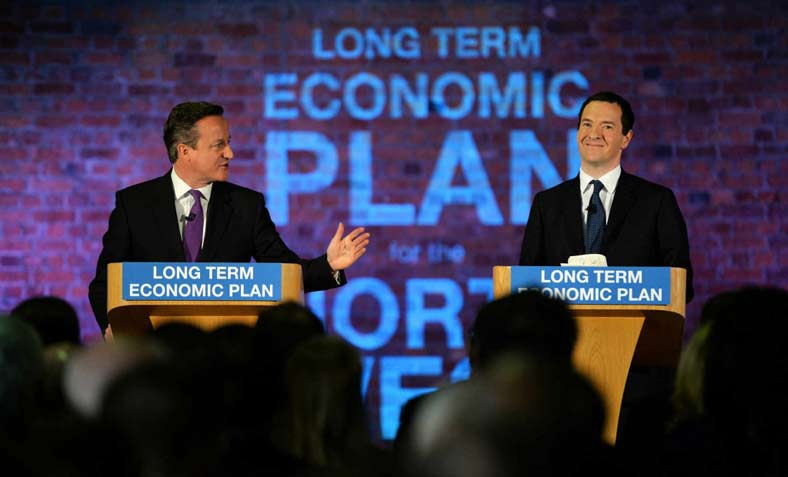 Cameron and Osborne in Manchester, 2015. Photo: Crown Copyright/Arron Hoare
Cameron and Osborne in Manchester, 2015. Photo: Crown Copyright/Arron Hoare
These are end times for David Cameron’s rule, but our side still has to act, argues Chris Bambery
There is a strong sense of decay wafting around David Cameron’s government. Since George Osborne’s budget, this hapless administration has been forced into a series of u-turns. Starting with Osborne having to immediately drop fresh cuts to disability benefits, the Tories then had to drop another key budget pledge that all English schools would have to become academies. Since then the government has had to bow to pressure and re-enter talks with the junior doctors, despite stating it would refuse do so, and over child refugees entering the UK.
The Hillsborough inquest’s verdict brought back the harsh reality of the Thatcher years. Cameron will likely also have to give the go ahead into an enquiry into the Battle of Orgreave, the key moment of the year-long 1984-85 miners’ strike, which will compound that.
But above all there is a sense that David Cameron is on the way out. He did, of course, say during last year’s Westminster election that he would bow out before the end of his term. But now there is a sense he will be going sooner rather than later, and certainly not a year ahead which would be midterm, when it was widely predicted he would summon the removal van to Downing Street.
Scathing
His anointed successor was George Osborne but in recent weeks fewer people are betting on him moving next door into 10 Downing Street. But it’s not just that Osborne’s budget turned sour so rapidly. Britain’s budget deficit has not come down and many Tory MPs are scathing about that and the fact that his boasts about British economic success have turned to ashes. Indeed Osborne does not seem to have his heart in it anymore.
But the biggest problem facing Cameron is the outcome of the EU referendum. If he loses and it’s a vote to quit, it’s hard to see him lasting long. Not just would he have lost the biggest gamble of his career but the UK government is going to face months and years of sorting out its exit from the UK and its future relations with it, plus it would likely find itself facing a fresh Scottish referendum on independence. There would be little point in hanging on to a lame duck Cameron for another year.
Who succeeds him is a big if. If it’s a vote to leave will it be Gove or Johnson? If it’s the other way round, will it be Theresa May? Any of those would be leading a weak and divided Conservative Party.
And here is the rub. Let’s imagine the result is a close vote to remain. The parallels with the Scottish referendum would be striking. A No vote was supposed to have secured Scotland’s place in the Union – it didn’t. Yes supporters kept on keeping on and the SNP swept the Westminster election and won this year’s Holyrood one, albeit not getting an overall majority because of the voting system.
A similar result in the EU referendum is supposed to settle the issue forever. It won’t. The anti-EU Tory MPs are fuming as they become victim to Project Fear. Ignore the fact they kept quiet when it was unleashed in Scotland, they are boiling. Witness the bitterness over Cameron’s decision to debate Nigel Farage in ITV, and not Gove or Johnson; or over the Governor of the Bank of England, Mark Carney’s, warning a recession will follow Brexit.
Livid
These people are not going to go quietly into the night if it’s a narrow vote to remain. Neither will such a result bury the issue. It’s going to smoulder on for years to come.
The referendum was Cameron’s way of trying to resolve an issue which has dogged the Tory Party for some three decades, but it won’t unless he gains a thumping vote to stay, which is not looking likely.
And it could get worse. The EU’s migrant crisis is worsening as Austria builds a fence along the Brenner Pass to stop migrants leaving Italy. In Italy a banking crisis is burning on slow fuse and the Italian government is livid with Wolfgang Schäuble, Germany’s finance minister, who won’t let them use public money to bail out the new EU regulations.
Strategically
That adds another element. A British exit would add to the problems facing the EU, which are not getting much better. If it’s the other way round a fresh Eurozone crisis would add to the alienation of the Leave camp.
So what to do? The Cameron government is vulnerable, very vulnerable. In England Corbyn can capitalise on that, which is why he’s being attacked over supposed antisemitism and why Labour MPs continue to queue up to demand he quits. In or out of the Labour Party we should ensure when they do they get the message loud and clear that they should shut up and let Corbyn get at the Tories. If they don’t they should get some of the same medicine they dish out.
In Scotland the pro-indy left needs to look beyond the border and identify Cameron as their target too, as I’ve written elsewhere.
On the first day of the last junior doctors strike it was great to see Corbyn and McDonnell joining their march, but SNP MPs took time to visit the picket lines at St Thomas’s. They were elected on an anti-austerity ticket and the anti-austerity movement down south should involve them. In Scotland we must never allow something like the junior doctor’s dispute happen and effectively ignore it.
There has to be a sense of urgency, and an understanding that strategically the fate of the Cameron government is hanging, perhaps not by a thread, but certainly by a piece of string. Socialist activity in the coming weeks can be decisive.

